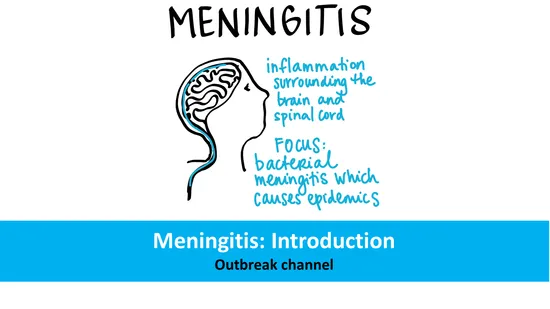Meningitis is an inflammation of the meninges – the covering of the brain and spinal cord – most often caused by an infection (viral, fungal or bacterial).
In Ghana, there are recurrent meningitis outbreaks particularly in the northern regions.
“There have been seasonal reports of meningitis in Ghana normally during the dry periods of October to March. During these dry periods with relatively low humidity and abundance of dust, individuals become susceptible to meningitis infection,” Ghana’s Ministry of Health has stated.
This has led to the conduct of regular mass preventive immunization campaigns in the country to address the burden of Group A meningococcus – accounting for an estimated 80–85% of all cases in the meningitis belt in the country, with epidemics occurring at intervals of 7–14 years.
What are the types of Meningitis?
- Bacterial Meningitis: This is caused by bacteria, such as Neisseria meningitidis, Streptococcus pneumoniae, or Haemophilus influenzae.
- Viral Meningitis: This is caused by various viruses, including enteroviruses.
Here are some Myths and Misconceptions about meningitis.
- Myth: Meningitis is always fatal
o Fact: While meningitis can be severe, early detection and proper medical intervention significantly improve outcomes.
- Myth: Meningitis only affects children
o Fact: Meningitis can affect individuals of all ages, including adults.
- Myth: Meningitis is not preventable
o Fact: Vaccination, good hygiene practices, and prompt treatment contribute to preventing meningitis.
- Myth: Meningitis is solely a result of poor hygiene.
o Fact: While hygiene plays a role, meningitis is caused by infectious agents, and outbreaks can occur even in clean environments.
By dispelling these myths and increasing awareness, efforts can be made to reduce the impact of meningitis, encourage vaccination, and promote early intervention for improved public health in Ghana.
Transmission, Symptoms and Diagnosis:
- Meningitis is primarily transmitted through respiratory droplets and direct contact with respiratory secretions. Overcrowded living conditions, such as those found in schools and dormitories, contribute to the rapid spread of the disease.
- Common symptoms of meningitis include severe headache, fever, stiff neck, sensitivity to light, and altered mental status. Early recognition and prompt medical attention are crucial for effective treatment and prevention of complications.
- Diagnosing meningitis involves a combination of clinical assessment and laboratory tests. Lumbar puncture, blood cultures, and imaging studies may be employed to confirm the presence of the infection and identify the causative agent.
How to avoid
- Vaccination: Routine immunization against specific strains of bacteria causing meningitis is crucial for prevention. Vaccination campaigns are often organized during outbreaks.
- Hygiene Practices: Encouraging good respiratory hygiene, such as covering the mouth and nose when coughing or sneezing, can help reduce the spread of the disease.
- Early Detection and Treatment: Timely identification of cases and initiation of appropriate antibiotic treatment are essential to prevent complications and further transmission.
By: David Yovo-Ofori





